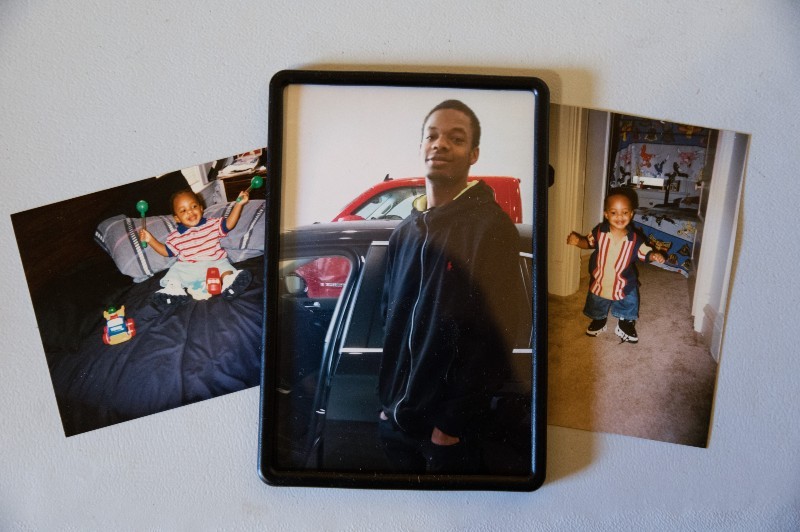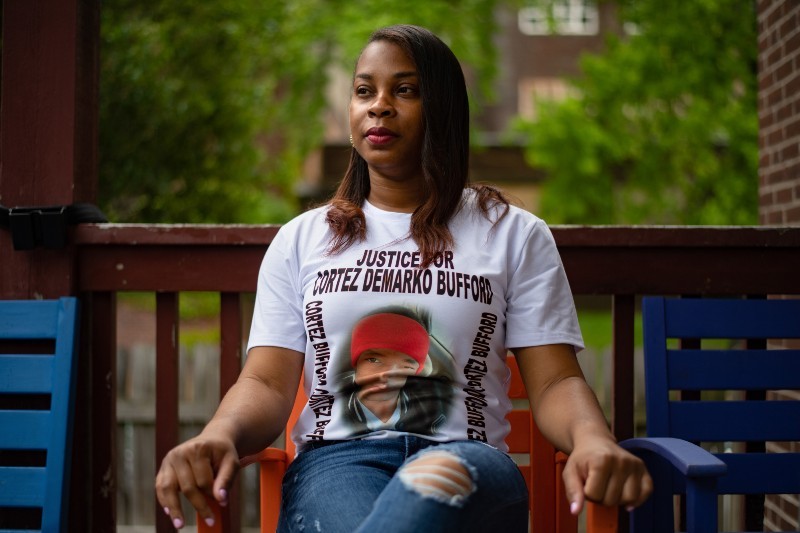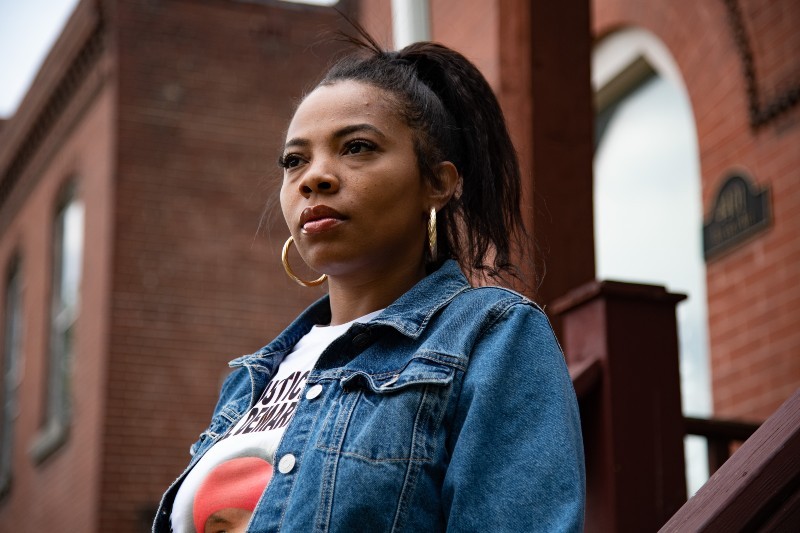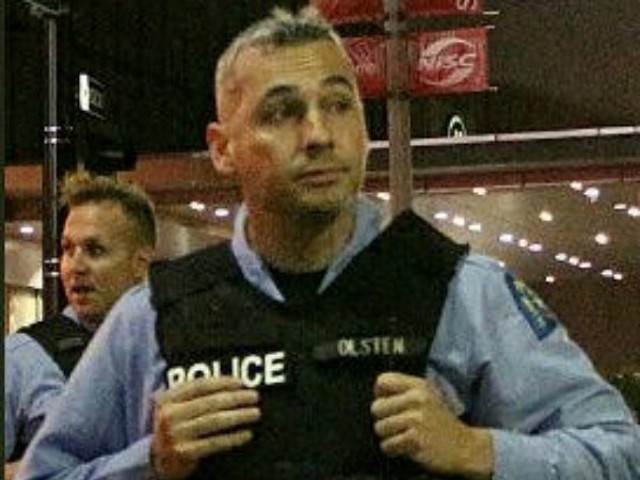
MICHAEL B. THOMAS FOR THE INTERCEPT
Childhood family photos of Cortez Bufford are seen on May 16, 2021, in St. Louis.
Baby Child
The youngest in a tight-knit family, Cortez Bufford spent all 24 years of his life in South City St. Louis, where he loved playing basketball in the backyard. They had a full court.
He was still living at home when he died.
“This is our baby child,” Antoine Bufford said of his son. “Can’t get rid of that last one.”
Cortez always loved fast cars. “I don’t think he knew how to drive slow,” said Monisha Merrill, his sister. His last car was a 1994 Firebird, which Antoine is trying to fix. A “dork” with glasses who got teased in grade school, Cortez took his first job — apart from his neighborhood lemonade and hot dog stand operation — as a dishwasher at the Old Spaghetti Factory. He loved working there, his parents remember, and was upset with them when he had to quit to take a big family vacation to New Orleans. Photo ops with alligators during a swamp tour cheered him up, but it was a sore spot for years.
He would eat ice cream and watch movies with his nieces and nephews and house-sit for his sister, Ericka Freeman, who described him as her sidekick who “always went for what was right.”
Cortez later took warehouse jobs at FedEx and UPS, earning employee accolades for his forklift operation skills. But he lost his job of several years after failing a drug test for smoking weed, his father said.
One of his last jobs was working at Henry’s Funeral and Cremation Service, a business his cousin Brandon opened in late 2017. It was there that his parents would view his body for the first time and his homegoing service would be held.
The Buffords, like many Black families, had “the talk” with Cortez when he was young — the one about the police, what his rights were, and the potential dangers ahead. He didn’t have any trouble with law enforcement until April 2014, four months before Michael Brown’s police killing in Ferguson. Driving the speed limit, and after making a legal U-turn, Bufford was pulled over. One officer demanded that he get out of the car. After Bufford protested and asked why he was being detained, two officers pulled him out of the car using an “armbar” technique, a painful attack on the elbow joint. Eventually nine officers came to the scene.
The encounter received national attention due to a viral dashcam video of his beating and arrest. The video shows two of the officers kicking, stomping, and tasing Bufford as he screams. Then, almost two minutes into the beating, an officer says, “Hold up, hold up y’all, hold up, hold up. Everybody hold up. We’re red right now, so if you guys are worried about cameras, just wait,” before shutting off the video.
Only after the officers subdued him did they realize that Cortez had a gun. He wasn’t old enough to be carrying it. He was arrested and charged, but after the public fallout, the case was dropped.

MICHAEL B. THOMAS FOR THE INTERCEPT
Ericka Freeman, sister of Cortez Bufford, poses for a portrait on May 16, 2021, in St.
The Buffords were in Chicago visiting family when they got the call that their son was hurt. When they returned to St. Louis, he was in bad shape. They observed gashes across his head and taser marks on his body. They took Cortez back to the doctor to get his hand recast. Physically, he survived, but “mentally, he was crushed,” Tammy Bufford said.
In 2015, Bufford filed a lawsuit against several officers, earning a $20,000 settlement. He had won, but, the family remembers, his lawyer warned him that he would be a target in the future.
In the four years that followed, Bufford was pulled over, stopped while walking, and harassed, his parents say. While there are no publicly accessible records or complaints documenting these events, there are reports of two arrests, one in 2017 for apparently not leaving a MetroLink station when asked and “pulling his arms back” (resisting arrest, trespassing, and marijuana possession) and one about three weeks before his death.
In that case, police reported that Bufford was driving a stolen car, an allegation not supported by the charges. When they tried to apprehend him, “the defendant began to flee on foot,” court records show. The officers caught up with him and made the arrest, putting a felony drug charge on his record.

MICHAEL B. THOMAS FOR THE INTERCEPT
Monisha Merrill, sister of Cortez Bufford, poses for a portrait at the Bufford home on May 16, 2021, in St. Louis.
Quite Rational Fear
Dr. C.C. Cassell, a licensed clinical psychologist in California who specializes in trauma, has worked extensively with survivors of community violence, sexual violence, and combat veterans who have experienced war-related trauma.
Cassell is acquainted with the Bufford family, though she never knew Cortez. In 2020, she helped the Buffords file a sunshine law request with the SLMPD. Then she brought the case to the Invisible Institute and The Intercept for further investigation.
Cassell recalls how the hypervigilance of her veteran patients suffering from post-traumatic stress disorder often manifests itself by carrying guns. Not one gun, but multiple guns hidden throughout their homes, with at least one on their person at all times.
“Having these weapons made them feel safe,” Cassell remembers. “They felt naked without them. For me, the surprising part was how familiar this behavior was.”
It reminded her of the Black men she knew, who did not carry weapons with an intent or desire to harm anyone, but simply because they never felt safe anywhere: “Even in their own homes. … Having a weapon was the only way they could regain a sense of safety, albeit a fragile one.”
Undoubtedly, Bufford was a trauma survivor. According to Cassell, the way he reportedly turned away from the police vehicle when he first saw it, which Officer #1 later described as “kind of suspicious” — that action alone, from a psychological standpoint, foregrounds his desire to avoid police interaction.
Phillips had seen Bufford’s fear of the police play out before. “Every time he seen them, I mean, like, every time he seen them, he just wanted to get away.”
Cassell says Bufford’s flight from police is “quite possibly a survival instinct driven by quite rational fear.” This leaves her to wonder: "What protections do we as U.S. citizens have when the very individuals who are employed to protect us pose a threat to our lives?"
Building on her deep experience working with trauma survivors, Cassell now focuses on helping people of color cope with race-related trauma.
“The concept of PTSD is meant to capture the aftereffects of trauma, hence the name ‘post’-traumatic stress disorder,” Cassell notes. “However, Black people in this country are facing continuous traumatic stress.”
Both Bufford and Phillips experienced such trauma. For Phillips, disturbingly, Bufford isn’t the first friend of his who has died from police gunfire after running down a St. Louis gangway: “When it's constantly happening, I'm not going to say you get immune to it, but you don't go through what you would go through if this was your first childhood friend.”
Cassell says it is “a sad reality” that Black men are often not given the opportunity to learn how to understand their ongoing trauma, “despite how pervasive this problem is.”
In Bufford’s case, Cassell could not diagnose him, but she does have a deep knowledge of his history and is struck by a pattern: He had no record of violence. Even during his previously documented police encounters, including one in which he was severely injured, he never attempted to use a weapon.
Also, notably, during his struggle to escape Officer #1 in the first gangway, when the officer pointed his gun at him “to protect myself,” Bufford did not pull the weapon then either, according to reports.
“What he wanted to do was get away,” said Phillips, who has his own problematic history with law enforcement, from a resisting arrest charge to drug and weapon convictions. Phillips insists that Bufford would not have pulled a gun on an officer: “He wanted to go home.”





